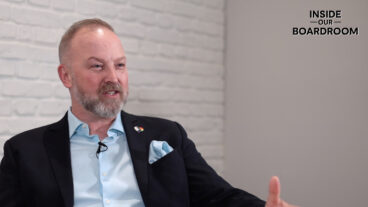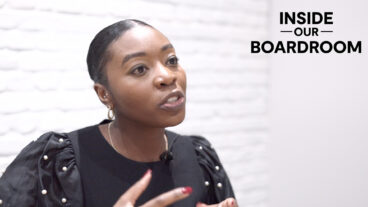Employee engagement is one of the predominant challenges affecting businesses today. Drew Dudley — an internationally acclaimed leadership expert — shows audiences how being purposeful about cultivating cultures of leadership within their organizations will not only increase employee engagement, but lead to higher employee happiness, pride, productivity, and retention.
Leadership is often used to describe an elite few. Drew shows audiences how leadership lives within us all, and empowers them to unleash their inner leader (and the leadership qualities within others) to create stronger organizations and communities. His approach is rooted in behavioural psychology and uses personal values to drive professional growth and enhance impact, both at home and work.
Called one of the most inspirational TED speakers in the world, Drew recently joined us “inside our boardroom” to discuss leadership and the importance of creating cultures of leadership within organizations, and how his unique approach is changing lives.
Answers have been edited for length and clarity.
Making an Impact: Everyday Leadership in Action
Speakers Spotlight: What was the pivotal moment in your life that shaped your view on leadership?
Drew Dudley: There’s been a lot of moments that shaped how I think about leadership, but the earliest one goes back to my last year in university. I met this extraordinary guy — when he walked in the room, people felt safer. That, to me, is leadership.
Unfortunately, he passed away before he had the chance to graduate and 2000 people showed up at his funeral. I remember looking around and thinking, what if this was you? Would this many people care? I realized that the answer to that question is no, because he planned every day to matter, to try to make the lives of the people around him better. While I tried to live my life for people I hadn’t even met yet.
It’s only when you have an impact every day that you matter, that you leave a legacy. And that’s when I started to realize that I and so many other people live their lives for people they haven’t met yet. I don’t want to spend my life that way. I want to live my life having a daily impact like that 23-year-old did. So that’s what started the shift for me and so much has gone into it since.
Drew digs deeper into the role “personal impact” has on everyday leadership in the video below:
Embracing Your Inner Leader
SpSp: What’s stopping people from embracing their inner leader?
DD: The biggest barrier to everyday leadership is the untaught lessons that get internalized. That leadership is for extroverts, for people who like to be the centre of attention, for big personalities. That gets internalized by every introvert, by everyone who has never seen themselves as leaders, because they never saw themselves in the examples they were given.
How do we overcome that? By starting to recognize that the biggest impact we have happens in the individual moments, not by what we achieve and acquire over time, but the individual moments of leadership. So, what I teach people is how to create those moments through a process rooted in behavioral psychology that helps people overcome those untaught lessons.
If we can find a way to let everyone in an organization know that their leadership is leadership, that their acts of individual impact is leadership, then we spread a culture of leadership. The more people within your organization that think like leaders, the better off your organization is. You can make better decisions and you can make them faster and more creatively.
Learn more about what holds people back from becoming leaders in the video below, and why its crucial to counteract that in your organization:
Cultivating Cultures of Leadership
SpSp: Where does an organization begin in trying to cultivate a culture of leadership?
DD: Hire me, I think is an excellent way of starting. But, in all honesty, culture has to cascade through an organization. The first step is to allow the culture creators, or senior people who play a role in the direction of the organization, its vision, and its culture, to identify the values they personally want to pour into their organization.
Research says that personal values are directly linked to employee engagement, happiness, and productivity. So it’s important for leaders and culture creators to say, what are our personal values that we want to live? That’s where it starts, because all major changes within an organization (behaviour wise) have to be modeled by the leaders in order to cascade down.
So, if you identify your core values and live them every day as a culture creator, then you’ll empower the next level of leaders within your organization to do the same, and that cascades down. You cannot ask for cultural shift from the bottom up. It has to come from the top.
Learn more about the impact workplace culture has on productivity and employee satisfaction and what you can do to cultivate a culture that inspires innovation and growth:
SpSp: How does one stay committed to their desired leadership behaviours?
DD: Practice. I wish there was an easier way. It starts by identifying one core value and one question to answer each day that will help you live your value. Then, it takes a disciplined effort, a commitment, to ensure you work on it a little bit each day. This repetition will breed habit, habit breeds cultural expectations, and cultural expectations are the most powerful controlling force on the planet. That’s why we talk about culture so much when it comes to organizations, because cultural expectations control our behaviour without us even thinking about it.
So, the more decisions in your organization driven by cultural expectations instead of rules, policies, and procedures, the better off you’re going to be. My work is trying to figure out and trying to teach people through behavioral psychology, how to actually turn that conscious effort into unconscious drive that will push you every day to behave the way you want to. It’s not just about avoiding relapse; it’s about making it an instinct.
Drew breaks down his roadmap to leadership impact in more detail in the video below:
The Power of Values and Purpose in Driving Change
SpSp: How do you address skeptics of values and their impact on leadership?
DD: I was asked to speak at a conference once, where they requested for the process to be demonstrated. They wanted me to give my regular presentation and then bring up three people who had been doing it for at least a month, a month and a half, and have them share their experiences.
They identified three people, one of whom was very gung-ho, one of whom was kind of ambivalent, and one who was doing it because they didn’t want to be asked to do this stuff again. I worked with each of them to identify their core values and define what those values mean to them. They then created their own leadership test questions, and for six weeks consistently asked those questions to themselves every day.
When I brought the three of them on stage, I didn’t know what they were going to say, which was terrifying. The third person said, I wanted to go to work and I wanted to do a good job, but what I didn’t think about was the impact I was having while I did my job. He said, this process allowed him to be more of the person he wanted to be, and that he didn’t realize that he could be more himself at work than he already was. It was really cool to watch this person realize that they were more than their job.
Look, I get pushback all the time from people saying the idea that everyone can be a leader is disturbing, because if you have worked 80 hours a week, if you went to all the best schools, if you were sacrificing time with your family and loved ones so that you could get the promotion, and then some guy comes in and says, everybody’s a leader, that is threatening to some people.
What I want to be clear about is that I’m not saying everyone can or should be president or CEO or senior VP. What I’m saying is that there is a form of leadership to which everyone can and should aspire, and you are better off if more people in your organization are doing that.
Skeptical about the impact values can have on leaders and their teams? Watch the video below to discover just how powerful values and purpose are in transforming organizations:
Hire Drew Dudley to Speak at Your Event
Drew Dudley is the founder and Chief Catalyst of Day One Leadership, where he has helped organizations around the world increase their leadership capacity. His clients have included such dynamic companies as Coca-Cola, American Express, JP Morgan Chase, the United Nations, and over 100 colleges and universities.
Contact us to learn more about Drew and his leadership roadmap can transform your organization and change the way you think about leadership in your life, workplace, and community.




